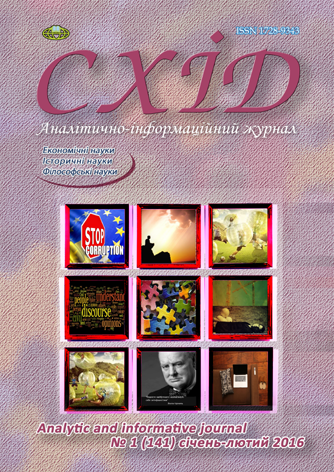Heidegger's ontology and his contemporaries: Husserl and Cassirer
DOI:
https://doi.org/10.21847/1728-9343.2016.1(141).64816Keywords:
ontology, reception, phenomenology, symbolic form, critiqueAbstract
Research into the history of understanding Heidegger's ideas allows to reveal how different thinkers were likely to grasp the specific subjective positions that defined the meaning of philosophizing as a cultural practice posited by modern era of intellectual history. The figure of Heidegger is crucial because it shed light on the more general context of the evolution of philosophizing within the system of scientific knowledge. A clear contrast between scientific rationalism and philosophical thinking, inherent for Heidegger's philosophy, is now hardly perceived within general coordinates of scientific philosophy of the last century, combining directions of phenomenology, Neo-Kantian tradition and positivism.
Understanding the nature of synthesis of phenomenological method with the principles of the philosophy of life that formed the core of Heidegger's thought was the point of reference of such thinkers like Edmund Husserl and Ernst Cassirer. The problem of how to reconstruct the contours of delineation between the aforementioned philosophical trends remains relevant today and, as the latter define the contours of contemporary philosophy so that the barriers between different traditions of philosophy only intensified.
Heidegger's desire to find premises of philosophizing, deeper than principles for a positivist and phenomenological science, would find support from Neo-Kantian thinkers, who also stood for autonomy of philosophy. But radical ontologism of Heidegger refused any possibility of dialogue. Husserl and Cassirer made critical remarks on ontologization as the leading motive of Heidegger's thought, which gave starting intention to further reception of Heidegger's work. It is ontology of time that has a threat of all consuming relativism and opportunism, since it deprives ethics from opportunities that would not fit the immanent structure of Dasein. Ontology of language fell prey to similar criticism, as Heidegger suggested lingual turn of existential analytics of Dasein. Cassirer in his own philosophy of symbolic forms forsaw the opportunity of linguistic totalization of being and developed his theory of generic symbolic forms.
Downloads
References
Carnap R. (1966), The elimination of metaphysics through logical analysis of language. In: Logical positivism, The Free Press,New York, pp. 45-83 (eng).
Cassirer E. (1931), Kant und das Problem der Metaphysik: Bemerkungen zu Martin Heideggers Kant-Interpretation, Kant-Studien, №3, S. 1-26 (deuth).
Collins R. (2002), The sociology of philosophies: a global theory of intellectual change,Cambridge, 1098 p. (eng).
Crowell S. G. (2001), Husserl, Heidegger, and the space of meaning: paths toward transcendental phenomenology, Northwestern University Press,Evanston, 323 p. (eng).
Elliott B. (2005), Phenomenology and imagination in Husserl and Heidegger, Routledge,London, 162 p. (eng).
Friedman M. (2000), A parting of ways: Carnap, Cassirer, and Heidegger, Open Court,Chicago, 190 p. (eng).
Hopkins B. C. (1993), Intentionality in Husserl and Heidegger: the problem of original method and phenomenon of phenomenology, Kluewer Academic Publishers, Dorderecht, 302 p. (eng).
Husserl E. (1997), Psychological and transcendental phenomenology and the confrontation with Heidegger (1927-1931), Kluewer Academic Publishers, Dorderecht, 510 p. (eng).
Keller P. (1999), Husserl and Heidegger on human experience, Cambridge University Press,New York, 262 p. (eng).
Overgaard S. (2004), Husserl and Heidegger on being in the world, Kluwer Academic Publishers, Dorderecht, 225 p. (eng).
Dakhnii A. Destruction as method of hermeneutical phenomenology of Martin Heidegger, Herald of Lviv University: Philosophy Series, pp. 29-37 (ukr).
Mikhailov I. (1999), Early Heidegger: between Phenomenology and Philosophy of life, Progress, Moscow, 283 p. (rus).
Downloads
Published
How to Cite
Issue
Section
License
Copyright (c) 2016 Andrii Karpenko

This work is licensed under a Creative Commons Attribution-NonCommercial-NoDerivatives 4.0 International License.
1. Authors bear responsibility for the accuracy of facts, quotations, numbers and names used.
2. Manuscripts are not sent back.
3. The publisher does not always agree with the authors' opinion.
4. The authors reserve the right to authorship of the work and pass the first publication right of this work to the journal under the terms of a Creative Commons Attribution-NonCommercial-NoDerivatives 4.0 International License. This license allows others to distribute (copy) the published work for non-commercial purposes, provided there is mandatory attribution to its authors and a link to the first publication in our journal.
5. The authors have the right to conclude separate supplement agreements that relate to non-exclusive work distribution in the form in which it has been published by the journal (for example, to upload the work to the online storage of the journal or publish it as part of a monograph), provided that the reference to the first publication of the work in this journal is included.

